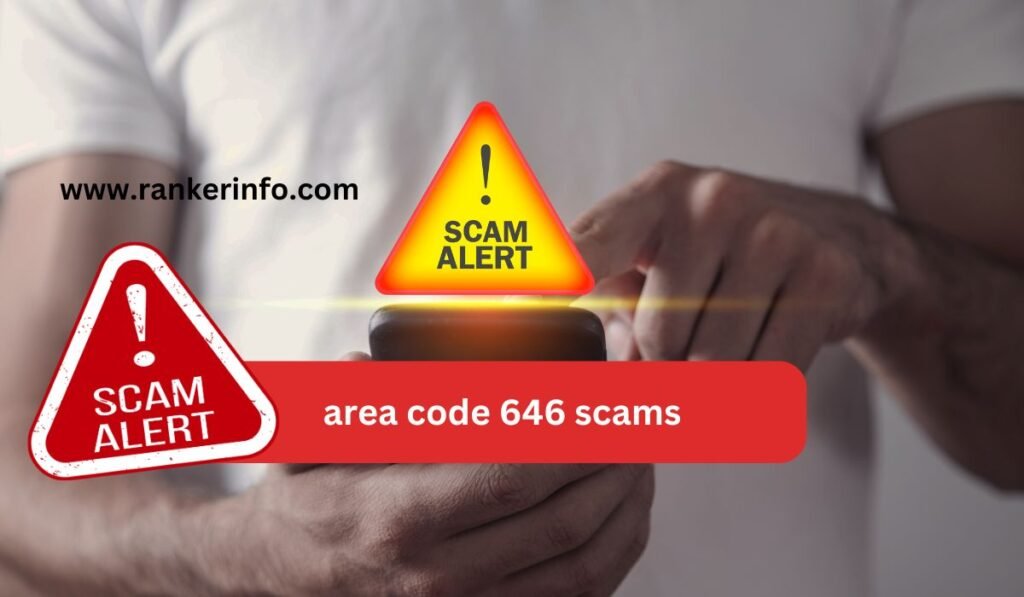Area code 646 scams involving 646 have gained momentum, and this code is primarily utilized, particularly in New York City. Due to these frauds, many victims receive fictitious calls, impersonation, and phishing with the numbers ending with 646. Apparently, it is important to comprehend the inner mechanism of such scams to protect oneself from potential financial loss or even identity theft.
This is why we have looked at this article, some of the most common area code 646 scams, how they function, some statistics as to the impact caused by such scams, and part of the things one can do to not fall prey. We are also going to look at some of the frequently asked questions about 646 scams and give practical solutions as to how to stay safe from them.
1. What area code 646 scams?
Area code 646 scams include fraudulent activities, usually performed by fraudsters, by calling or texting people through a 646 area code phone number. It involves convincing the people to either provide some sort of personal information or transfer money or even let them access some sensitive information. These scams largely include people in New York City because of the 646 area code; however, it can target any person in the United States as any fraudster will spoof the number to make his call look authentic.
In technical support scams, a fake technician calls and tells you that something is wrong with your computer. They will ask you to remotely access them or provide personal information to fix a problem that does not exist.
Social Security Scams:
Callers impersonate the SSA, telling victims there is an issue with their social security number and that they will be suspending their benefits unless they take immediate action. Grandparent Scams:
The scammers use the identity of some grandson or a relative in trouble and needing help immediately financially because of something urgent.
Prize or Lottery Scams:
The victim is informed of a prize or lottery they have won but have to pay preliminary taxes or fees to get their award.
Spoofing Tactics
These scammers’ big tools being put to work include caller ID spoofing, meaning they mask their real phone number with a local 646 number. Such a technique will raise the chances that the recipient will pick up the call, thinking it is some kind of legitimate local caller.
Stats Related to Scams and Fraud Over the Phone
In recent years, more phone scams have been observed, partly because of the increased use of cell phones and VoIP. A few key statistics, to consider, which really drive home the extent of the problem, include the following:
| Year | Total Fraud Reports (FTC) | Reports Related to Phone Scams | Financial Loss (USD) from Phone Scams |
|---|---|---|---|
| 2020 | 2.2 million | 1.1 million | $540 million |
| 2021 | 2.4 million | 1.3 million | $860 million |
| 2022 | 2.8 million | 1.5 million | $1.2 billion |
| 2023 | 3.2 million (est.) | 1.7 million (est.) | $1.5 billion (est.) |
In fact, in 2022 alone, fully one out of every two fraud reports filed with the FTC was about a phone scam. In 2022, losses through phone scams reached over $1.2 billion at an average of $500 per unfortunate victim. Most of this fraud would have come through numbers commencing with area codes like 646 to reach the large urban centers.
How to Identify 646 Area Code Scams
It is tough to identify a 646 area code scam call, for the ways through which these scammers operate are usually a bit complex in presenting their calls as real. However, these are a couple of warnings you should pay close attention to:
Common Warning Signs of a Scam Call
Unsolicited Calls:
If you get any call from the 646 numbers unexpectedly, be sure you better beware.
High-Pressure Tactics:
Scammers do call on the basis of installing fear or urgency, for instance, telling you that should they fail to carry out the request, serious repercussions are coming their way. For example, one would say he or she will get arrested in the case of failure to address their issue. Asking for personal information
As such, no valid entity – let alone those of the IRS and Social Security – would ever call any person asking for his or her personal information that would naturally include social security numbers. Untraceable Means of Transfers Demanded
Most of the targeted scams ask for transfers via wires, gift cards, or cryptocurrency – usually highly untraceable and irrecoverable.
Most Reported 646 Area Code Scams
Now, let’s consider some of the most prevalent frauds that take place in relation to 646 area code usage:
IRS Impersonation Scam
Calls from the number 646 are the calling card of the victims of this scam, wherein one who calls impersonates an IRS representative. They are informed that back taxes were owed which had to be paid forthwith either by prepaid cards or wire transfer. They are further threatened with arrest or other such legal action unless the money was paid.
Of the IRS scam calls reported in 2022 alone, over 600,000 reported losses totaling $400,000,000+
Tech Support Scam
Scammers call victims to say there is something wrong with their computer and they need remote access to the computer to fix it, or they call saying they can fix the “problem” for a fee. Calls often come from spoofed numbers starting with the 646 prefix; this can make them appear more legitimate. The BBB reports this tech support scam has losses of over $200 million nationally in 2022.
Social Security Scam
Impostors of SSA call up the victims and ask for some sensitive information and/or some sum of money in order to solve the problems which, as a matter of fact are created by one social security number which was somehow compromised.
Over 400,000 scam calls were reportedly received by the Social Security Administration Office of the Inspector General in 2022 at an estimated loss of $150 million.
How to Protect Yourself from Area code 646 scams
Steps to Take When You Receive a Suspicious Call
Do not answer Calls from Unknown Numbers:
Let unknown callers go into your voicemail unless you are expecting a call. Many scammers won’t leave a detailed voicemail.
Check who the caller is:
If anybody calls themselves, either from the government or from any company, just hang up and dial the official number to check whether it’s any legit call.
Do not give away personal information:
Never give out sensitive information like bank account numbers or social security numbers to anyone unless you are positive with whom you are speaking. Report the Scam: FTC or FCC traces such scams and warns others from this particular number. Block and Report the Number: Block the number with your phone so it won’t call you again with the same 646 number.
FAQs About Area code 646 scams
A. If You Receive a Call from a Number Whose 646 You Are Not Familiar With?
An unsolicited call to your number from an unknown number starting with 646 should be allowed to go into voicemail. If the message left is suspicious, do not call back. Simple, look up the number yourself online or call the company or government agency they said they’re with directly.
B. Do the 646 area code scams affect only New York residents?
No, while the 646 area code is assigned to New York City, scammers looking to target anyone in the U.S. may spoof it.
C. Is there some way I might block those calls coming from this 646 area code?
Yes, you can block suspicious 646 area code numbers on your phone through inbuilt features of a phone or third-party applications. But once more, bear in mind that these scammers very often change their numbers, so you’re still out to be pretty cautious.
D. How do I report a 646 area code scam?
One is free to report the scam calls to FTC, FCC, or SSA OIG depending on the fraud type. Such reporting has helped these agencies track many frauds in operation.
E. What kind of frauds happen most on 646?
The IRS impersonation frauds, frauds of tech support, social security frauds, and prize/ lottos-the fraud most occurring on the 646 area code .
Conclusion
Frauds reported with this 646 area code increase the need for awareness and vigilance. The general trend of spoofed calls is to impersonate somebody in such a way as to instill fear in the minds of people and thus extract sensitive information or a fund transfer. Where the general type may differ, proper understanding and recognition of suspicious calls can save one from being a victim. Always verify the calls and never give away your personal information but rather report the same to proper authority.
Also Read: upc: 37431881809 parts

